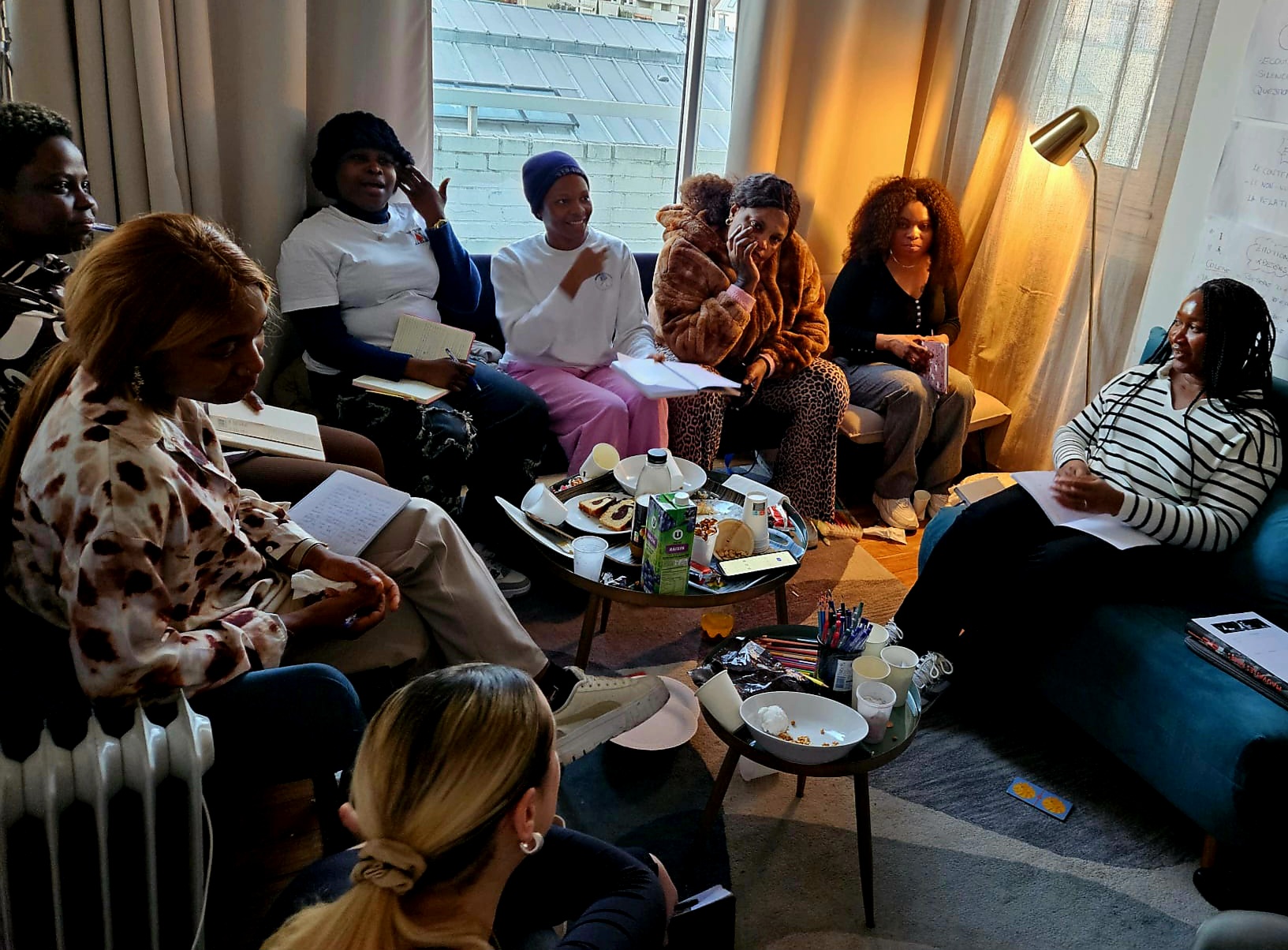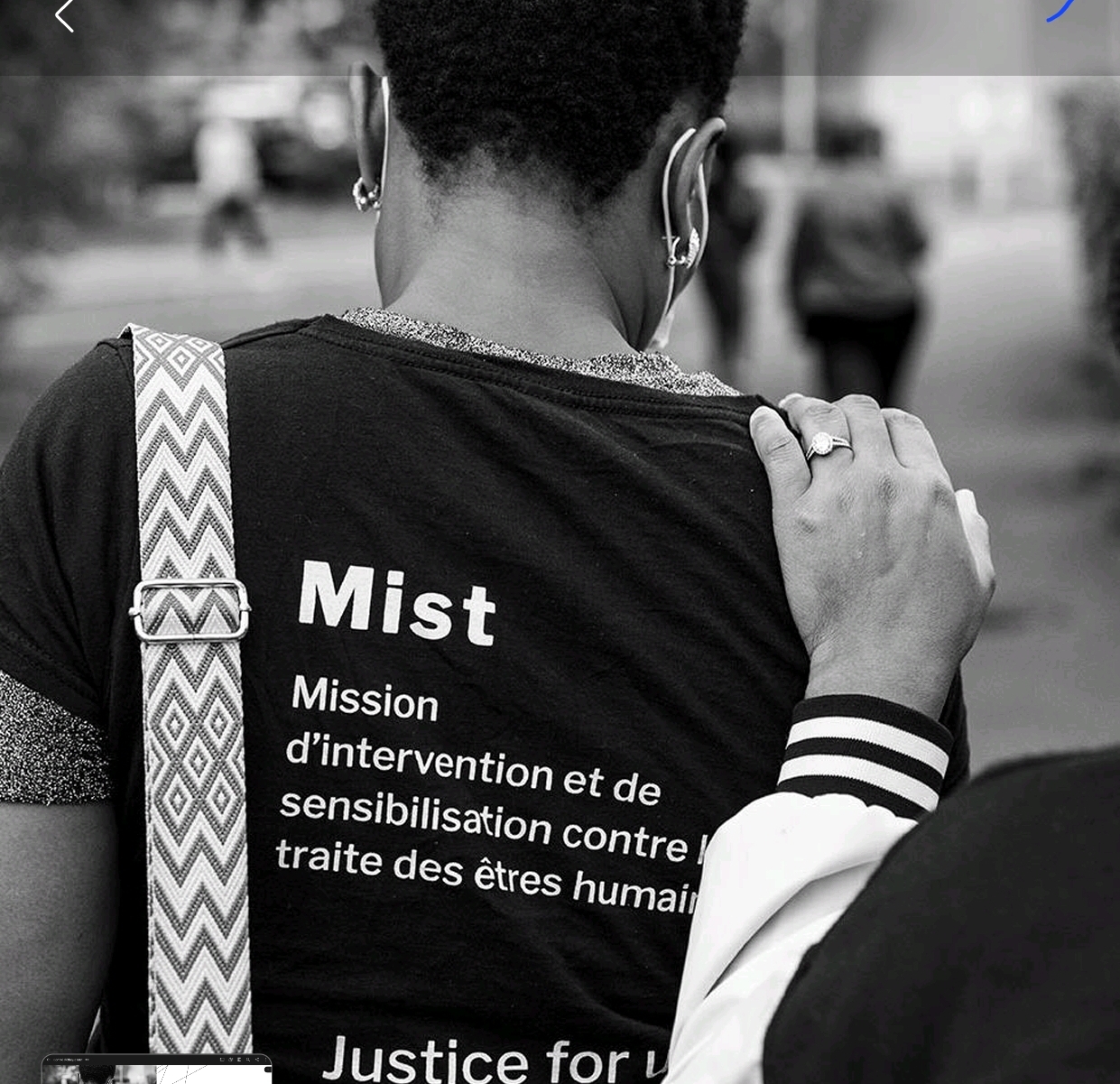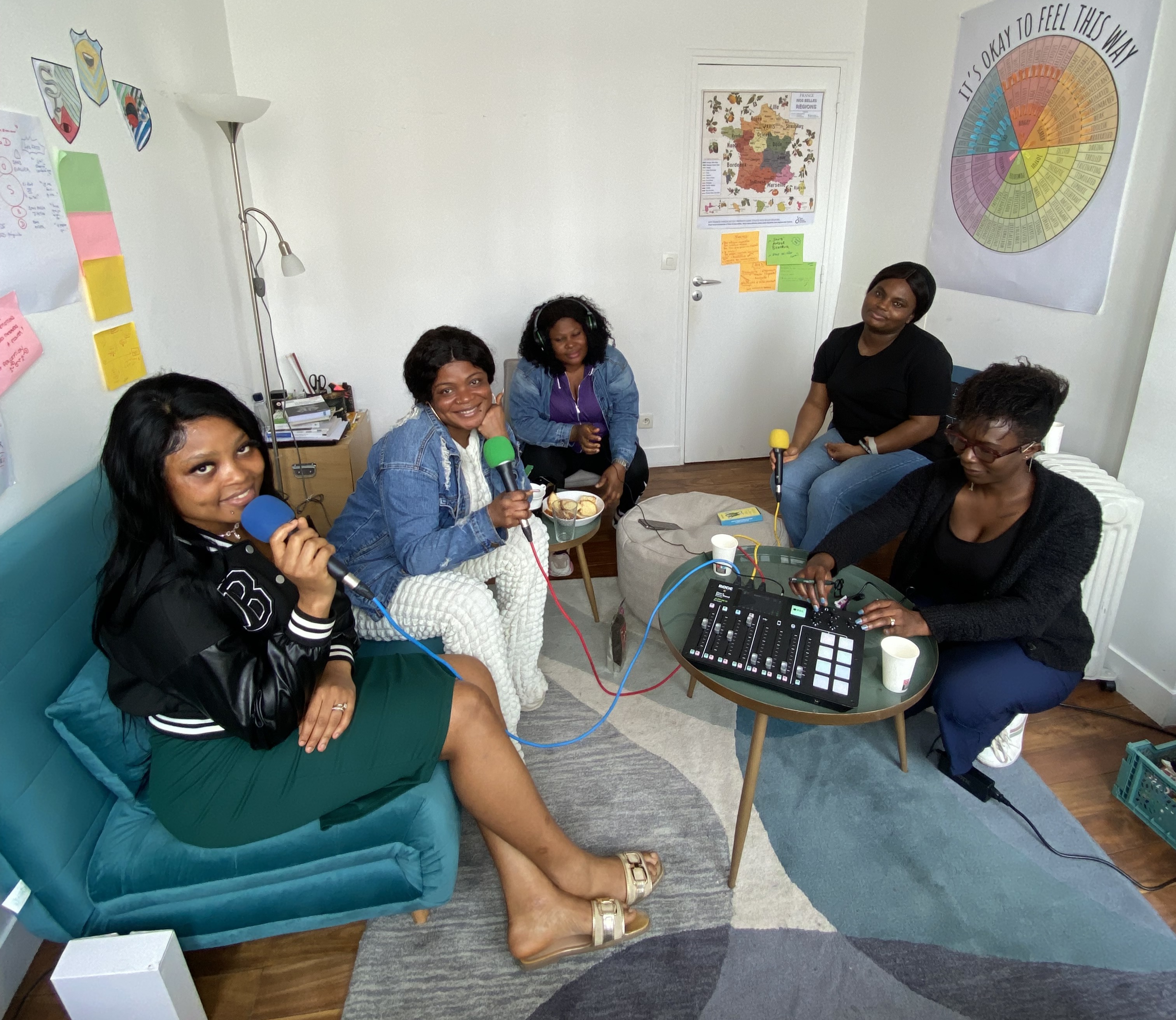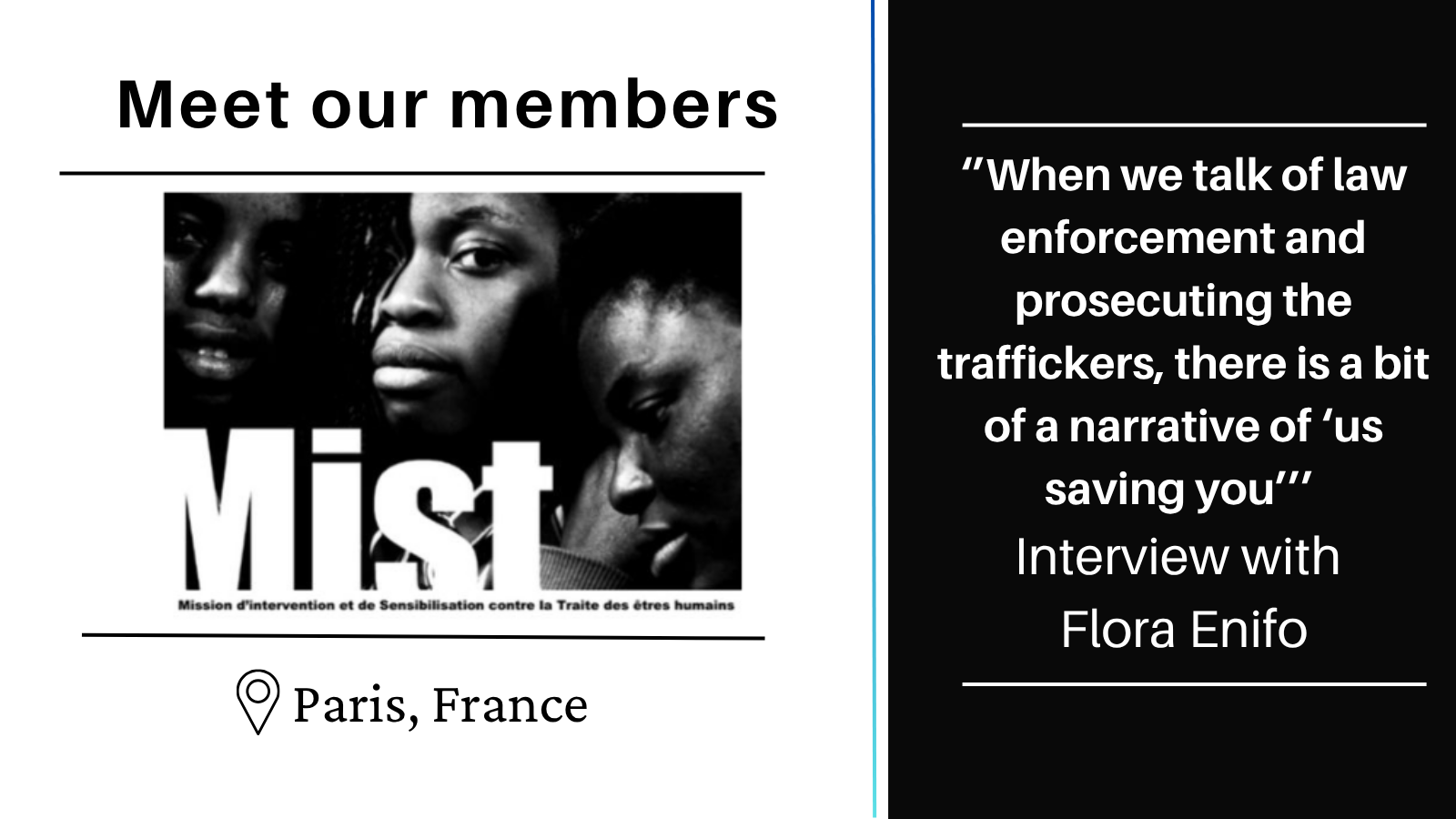As part of GAATW’s efforts to highlight the work of our members on the World Day Against Trafficking in Persons, our Programme Officer Alliance Strengthening, Vivian Cartagena, spoke with Flora Enifo, Community Organiser from MIST Association, an organisation based in Paris, France. Flora shared how MIST supports Nigerian women affected by trafficking, the challenges they face, and what the situation looks like on the ground for migrant communities in France.
Vivian: Welcome Flora, thank you for taking this time with us! I would like to know more about MIST's story. When was it founded and what was the vision it started with?
Flora: Thank you Vivian, my pleasure. MIST Association (Mission d'intervention et de sensibilisation contre la traite des êtres humains) was founded in 2020 by Nigeria women who have survived human trafficking for sexual exploitation. The Nigerian human trafficking network has been operating in France for the past 25 years and the Nigerian victims have been the most numerous identified victims of trafficking in France. As you may know, it is one of the largest and most well-known phenomenon in France. The Mist Association was created to encourage the participation, inclusion and engagement of survivors in the fight against human trafficking for sexual exploitation. We also believe strongly that the Nigerian community has been one of the most affected communities by human trafficking for sexual exploitation, and that they have a significant role to play in the protection of other victims around the world. The vision it started with was to foster the participation and the visibility of the survivors’ work and success, as the best way to improve victims’ assistance and to combat the trivialization of violence inside impacted communities.

Vivian: Could you tell us more about this phenomenon ? How is it when they arrive in France?
The criminal networks of human trafficking exist between Nigeria and France for more than 25 years. Nigerian victims are mainly coming from Edo State (South-Western Nigeria) where violence against women is quite endemic. Recruited in Nigeria, the victims are transported to Europe by traffickers to be exploited through a debt bondage from 30,000 to 65,000 Euros per person (depending if they are transported by plane or by sea). They are asked to pay this amount of money through prostitution once they are in Europe (sometimes before if the journey takes too long), where they are monitored and controlled, often victims of violence and threat. They mostly stand on the street, some in the middle of the forest at night, despite rain, snow, winter…all because they're trying to pay a huge debt that's been tasked by the trafficker.
Nigerian victims are usually bonded to their traffickers through an oral agreement they took in front of the customary law in Nigeria, during ceremonies set up in religious temples where they swear an oath to pay a debt and keep this agreement secret or they will become sick, sterile or dead (“oath taking ceremonies”). In 2018, as a religious chief, the King of Benin City (Oba) banned these ceremonies in all the temples under his power and freed all the victims who had been trapped in these contractual, oath-bound relationships.
Vivian: Which issues do you work on, and what are the main communities you work in?
We work mostly on human trafficking for sexual exploitation. Most of our beneficiaries are victims from West Africa, specifically Nigerians, but also other communities such as the victims from Ivory Coast, the Democratic Republic of the Congo (DRC) or Angola. The French young women and teenagers are more and more of them in the association. There are many of them who are victims of sexual exploitation in France and they are becoming more and more active into Mist. South Americans are also increasingly numerous since the pandemic.
Vivian: What are your main work strategies and the biggest challenges in the current context related to the risk of human trafficking?
We have several strategies in relation to membership in our organization, as well as advocacy. In relation to membership; we have different types in MIST, the active members and other members. While the active members are the people who are more engaged in the fight against human trafficking, they engage in taking risks because they do outreach to meet the girls to explain their human rights and also support them. They also assist and accompany them in case they're in danger, or when they want to escape from the traffickers. They support them through justice and administrative procedures. Our active members do this because it is crucial for victims to receive psychological and emotional support from people who have experienced similar situations themselves.

In relation to advocacy, some of our members have had meetings with stakeholders such as the Council of Europe in order to give recommendations towards the fight against human trafficking, what to do, how to protect victims, and better ways to help the victims. We defend the idea that the victims must be consulted on how they were treated when they were victims. In France, the victims of trafficking are under-represented in associations and social services. They find it difficult to verbalize the stages of their journey. There are no spaces for the participation and inclusion for survivors in the fight against trafficking. Probably because most people feel that they don't know anything, these are some of the mindset we tried to change through Mist. We try to let them know that these victims have the best story to tell about trafficking. They must be given the space to express their feelings, how they felt and how they can assist in the fight against human trafficking, how they can protect other victims, what they have to bring in and their points of view etc. This is what we really stand for in MIST.
One of the biggest challenges that we face is that when we think of law enforcement and prosecuting the traffickers, then there is always kind of, I would say, it's a lot of bias also to the migrant communities, because they think a lot of exploitation and trafficking happening within the migrating communities, and there is a bit of a narrative of ‘us saving you’. As an organization of people of color can be a very challenging space to be in, especially when you're in a white dominant society.
Earlier, everybody was afraid to take the lead, everybody was afraid to speak out or to go to social workers, but now they're beginning to see the MIST has been assisting and giving them a lot of energy to fight for themselves and to accept who they are, accept their story and grow with their story and grow from their story. This is changing. We are happy about that because initially they don't see anything wrong with trafficking. They believed that this was a favour. “This person has brought me to Europe, so is my God, you know, so I have to serve him. I have to pay the debt of 70,000 Euros.” So now they're beginning to realize that it's not normal. And this is what we are trying, this is what we need to do.
Vivian: How do you incorporate the perspectives and learning of women and children, which result in survival of human trafficking, in your work?

For instance, we do podcasts. We have groups who produce podcasts and then publish them on social media (YouTube channel). The reason behind doing this podcast is for them to send a message across the world, i.e other victims outside of France, other victims who are out there, to let them notice that there are people who lived through similar experiences, that went through this situation before and that are still here to motivate them, encouraging them to speak up and to accept themselves and fight for their rights. We do this type of podcast for other victims but also for other people, you know, to make recommendations to other institutes/organisations about how to better protect the trafficked persons. Season 3 is called “Seven days to change your life” and it is very interesting because it is a real peer to peer coaching program. This season was produced through a project co-funded by the European Commission called "Voice Over". Season 4 will start soon and it will be the first program made by our French members !
Vivian: Thank you for this conversation Flora. It was a pleasure learning more about MIST.

